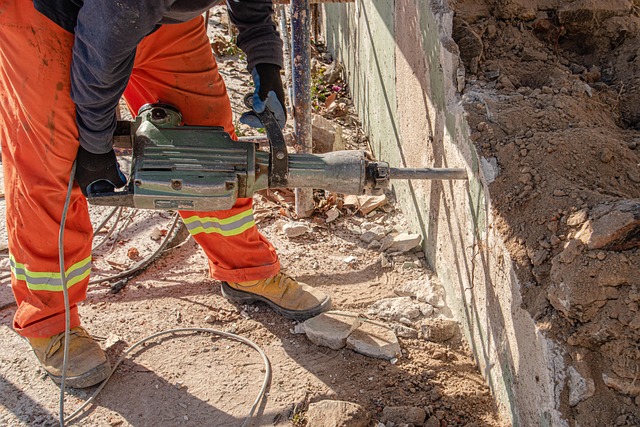Unlocking Albany’s Smooth Drives: Paving Contractor Secrets Unveiled

Albany paving contractors offer affordable and durable asphalt solutions for walkways, driveways, and parking lots. They provide expert installation,…….
Welcome to an extensive exploration of the world of Albany Paving Contractors, a critical component in urban development and infrastructure maintenance. This article aims to dissect and demystify the multifaceted role these contractors play, offering valuable insights for industry professionals, policymakers, and anyone interested in the evolution of modern cities. By delving into various aspects, we will uncover the intricacies of this field, highlighting its global impact, economic significance, technological innovations, and the challenges it faces.
Definition: An Albany Paving Contractor is a specialized construction firm primarily engaged in the installation, maintenance, and repair of paved surfaces. These surfaces include roads, highways, parking lots, airports, and pedestrian walkways. Their expertise lies in ensuring these critical infrastructure elements are built to last, maintain their structural integrity, and withstand various environmental conditions.
Core Components:
Paving Materials Expertise: Contractors must possess extensive knowledge of different paving materials such as asphalt, concrete, cobblestones, and brick pavers. They understand the unique properties, applications, and maintenance requirements of each material.
Construction Equipment: Albany Paving Contractors invest in advanced construction equipment like pavers, rollers, scrapers, and milling machines. These tools enable precise and efficient installation, repair, and maintenance of paved surfaces.
Project Management: Effective project management is key. Contractors coordinate with clients, obtain necessary permits, develop detailed plans, and oversee labor and material resources to ensure projects are completed on time and within budget.
Quality Assurance and Control: Implementing rigorous quality control measures ensures the highest standards of workmanship. This includes regular inspections, testing, and adherence to industry best practices.
The concept of paving contractors traces back centuries, evolving from simple road construction techniques to highly specialized services we see today. Here’s a brief timeline:
Ancient Times: Early civilizations used natural materials like gravel, mud, and stone for road construction. The Roman Empire introduced advanced techniques, utilizing concrete and mosaic pavers, which set a benchmark for future generations.
Medieval Period: Stone-paved streets became more common in European cities during the Middle Ages. Craft guilds played a significant role in training skilled stonemasons responsible for laying these intricate stone patterns.
Industrial Revolution (18th – 19th Centuries): The advent of steam engines and mechanical innovations revolutionized road construction. Asphalt, or bitumen, was introduced as a paving material, leading to the development of macadam roads.
20th Century: Modern paving techniques emerged, incorporating concrete and asphalt mixes. The rise of urban centers demanded efficient infrastructure solutions, giving birth to specialized contracting firms.
International Influence: Albany Paving Contractors have a profound global impact, with their services extending across borders. International development projects often require these experts to navigate diverse terrain, climates, and cultural contexts. For instance, Chinese construction companies have played a significant role in building roads, bridges, and airports in Africa, Asia, and South America, employing local paving contractors to ensure project success.
Key Trends:
Sustainable Paving: There is a growing emphasis on environmentally friendly practices. Recycled materials, permeable pavers, and energy-efficient lighting are gaining popularity in urban areas.
Smart Cities and Digitalization: Integrating technology into paving projects is a rising trend. Smart sensors, connected vehicles, and digital mapping enhance traffic management, infrastructure monitoring, and overall city efficiency.
Off-Site Production and Modular Paving: Precast concrete pavers and off-site production facilities are revolutionizing construction speed and quality. This trend is particularly evident in high-density urban areas.
Regional Differences:
| Region | Common Paving Materials | Climate Considerations | Cultural Influences |
|---|---|---|---|
| North America | Asphalt, Concrete | Extreme temperatures require specialized mixes | Emphasis on durable, long-lasting surfaces |
| Europe | Asphalt, Concrete, Stone | Diverse climates from temperate to Mediterranean | Historical influence of intricate stonework |
| Asia | Asphalt, Concrete, Cobblestones | Hot and humid conditions dictate material choices | Incorporation of traditional elements |
| Africa | Asphalt, Gravel (for rural areas) | Variable climates demand versatile solutions | Localized materials and techniques |
Market Dynamics: The global paving contractor market is highly competitive, with varying levels of specialization. According to a 2022 report by Market Research Future (MRFR), the market size was valued at USD 358.9 billion in 2021 and is projected to grow at a CAGR of 6.7% from 2022-2029. This growth is driven by factors like urbanization, infrastructure development, and increasing road construction projects globally.
Investment Patterns: Private equity firms and infrastructure investment funds are increasingly targeting paving contractor companies due to their stability and essential role in economic development. These investments often focus on technology upgrades, fleet modernization, and expanding service offerings.
Economic Impact: Albany Paving Contractors contribute significantly to local and national economies:
Innovation in Paving Techniques:
Warm Mix Asphalt (WMA): WMA is an environmentally friendly alternative to conventional hot mix asphalt. It uses lower temperatures, reducing energy consumption and emissions. This technology is particularly useful in regions with stringent environmental regulations.
Self-Healing Concrete: Researchers are developing self-healing concrete by incorporating bacteria or polymers that initiate repair when cracks form. This innovative material could significantly extend pavement lifespan.
3D Printing of Pavements: Experimental 3D printing technologies offer rapid prototyping and custom design possibilities for paving projects, potentially reducing construction time and waste.
Digital Tools and Software:
Key Policies and Regulatory Frameworks:
Transportation Infrastructure Laws: These laws dictate road construction, repair, and maintenance standards, ensuring contractors adhere to safety and quality guidelines.
Environmental Regulations: Paving projects must comply with pollution control measures, waste management rules, and emissions standards to protect local ecosystems.
Workplace Safety Standards: Agencies like OSHA (Occupational Safety and Health Administration) in the US set regulations to ensure contractor employees work in safe conditions.
Permitting and Licensing: Local authorities issue permits and licenses for paving projects, ensuring proper planning and adherence to zoning regulations.
Influence on Development: Effective policies and regulations promote:
Main Issues Faced by Albany Paving Contractors:
Seasonal Weather Conditions: Extreme temperatures, heavy rainfall, and snow can delay projects, impacting timelines and budgets.
Material Supply Chain Disruptions: Global supply chain issues, particularly for critical materials like asphalt and aggregate, can cause delays and cost overruns.
Labor Shortages: Skilled labor shortages are a recurring challenge, leading to increased training costs and potential project delays.
Environmental Concerns: Critics argue that traditional paving methods contribute to air and noise pollution. However, advancements in technology and materials are addressing these issues.
Proposed Solutions:
Case 1: Smart City Infrastructure in Singapore
Singapore, known for its technological prowess, implemented a comprehensive smart paving initiative. The project involved installing sensors beneath the pavement to monitor traffic flow, detect cracks, and optimize street lighting. Albany Paving Contractors played a crucial role in this venture, integrating advanced technologies while ensuring the durability of the paved surfaces. This case study exemplifies how technology enhances urban infrastructure, setting a global benchmark for future developments.
Case 2: Sustainable Airport Renovation in Sweden
A major airport in Sweden underwent a renovation project with a strong focus on sustainability. The contractor utilized recycled materials, implemented a permeable paving system, and incorporated solar-powered lighting. This approach reduced the airport’s carbon footprint while providing a modern, eco-friendly passenger experience. The successful outcome attracted international attention, inspiring similar projects worldwide.
Case 3: Community-Driven Urban Renewal in Brooklyn, NY
A local Albany Paving Contractor collaborated with community organizations to revitalize a bustling neighborhood. By involving residents in the design process, they created unique paved spaces that accommodate various activities, from farmers’ markets to outdoor exercise classes. This project not only transformed urban space but also fostered community engagement and pride. It serves as a testament to the contractor’s ability to contribute to vibrant, inclusive communities.
Potential Growth Areas:
Renewable Energy Integration: Integrating solar panels and wind turbines into paved surfaces is an emerging concept, offering sustainable energy solutions for urban areas.
Autonomous Construction Vehicles: Self-driving heavy machinery could revolutionize construction sites, improving efficiency and safety.
Digital Twin Technology: Creating digital replicas of physical infrastructure allows for real-time monitoring, predictive maintenance, and enhanced project planning.
Strategic Considerations:
Albany Paving Contractors are unsung heroes in the creation and maintenance of modern cities. Their work goes beyond laying down concrete; it involves intricate planning, skilled craftsmanship, and a deep understanding of technology and sustainability. As urban populations grow, these contractors will continue to play a pivotal role in shaping vibrant, resilient, and environmentally conscious communities.
By embracing technological innovations, adhering to stringent regulations, and fostering community engagement, Albany Paving Contractors can navigate the challenges of today and tomorrow. This article has provided a comprehensive overview, shedding light on their significance, global impact, and the exciting prospects that lie ahead.
Q: What sets an Albany Paving Contractor apart from a general construction company?
A: Albany Paving Contractors specialize exclusively in paved surface installation and maintenance. They possess advanced expertise in paving materials, equipment, and techniques, enabling them to deliver high-quality, specialized services.
Q: How do I choose the right paving contractor for my project?
A: Consider factors like experience, references, insurance coverage, and their understanding of your project’s unique requirements. Request detailed proposals, compare prices, and ensure they comply with local regulations.
Q: What are some common signs that my paved surface needs repair or replacement?
A: Look for cracks, uneven surfaces, potholes, visible damage to the base layers, and areas of weakened material. Regular inspections can help identify potential issues early, preventing more extensive repairs.
Q: Can paving contractors assist with traffic management during construction?
A: Absolutely! Many contractors offer traffic control services, including setting up barriers, signage, and temporary signal lights, ensuring safe and efficient navigation around the construction site.
Q: How can I make my paved surface more eco-friendly?
A: Opt for recycled materials, choose permeable pavers for better water infiltration, and consider energy-efficient lighting. Additionally, selecting environmentally friendly cleaning and maintenance products contributes to a greener approach.

Albany paving contractors offer affordable and durable asphalt solutions for walkways, driveways, and parking lots. They provide expert installation,…….

Pavement deterioration due to weather and traffic is natural but can cause structural damage and aesthetic issues. Albany paving contractors offer sol…….

Albany homes often face gutter issues like clogs, leaks, and separation due to debris buildup, rainfall, and aging materials. An Albany paving contrac…….

Albany paving contractors offering free estimates provide transparency and peace of mind for homeowners and businesses initiating pavement projects li…….

Albany paving contractors manage meticulous commercial asphalt laying, starting with subgrade prep and aggregate base installation. Key steps include…….

Albany paving contractors play a vital role in enhancing road safety and aesthetic appeal through meticulous pavement marking installation and mainten…….

Regular repair and sealcoating by an Albany paving contractor are essential for maintaining commercial pavement's integrity, aesthetics, and life…….

Optimizing commercial parking lots in Albany with a trusted paving contractor is crucial for efficiency and customer satisfaction. Services include la…….

Walkway resurfacing costs in Albany vary by material, project complexity and repairs needed. Engaging an Albany paving contractor for assessments ensu…….

Albany's variable climate poses gutter maintenance challenges. An Albany paving contractor offers solutions: repairs, replacements, and routine m…….